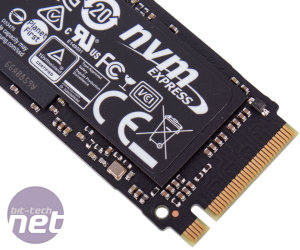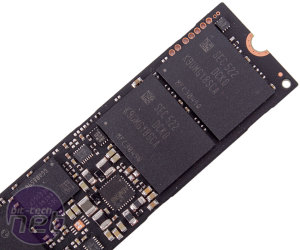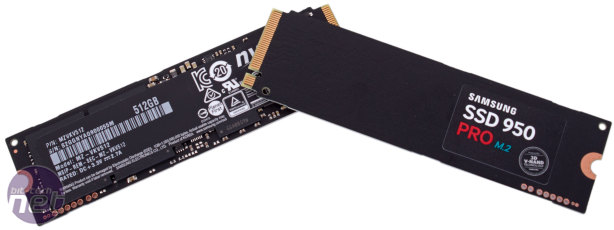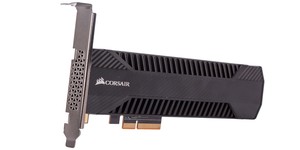
Performance Analysis
The CrystalDiskMark figures show extremely strong fresh-out-of-box results. The sequential numbers are from a queue depth of one, and even here the SSD 950 Pro is well above 2GB/sec on reads. For writes, both drives perform beyond their stated figures, with the 512GB drive being especially impressive at 1,536MB/sec, which is more than 300MB/sec more than Intel's SSD 750 1.2TB. Random performance favours Intel's drive overall, however, particularly at high queue depths, though the Samsung drives are better with low queue depth random reads.For a drive with no additional overprovisioning, the 950 Pro performs extremely well in steady state. That said, the 256GB isn't as fast as the equivalent SSD 850 Pro, but the 512GB drive was significantly quicker. That said, neither drive could match the Intel SSD 750, which is helped in large part by its massive overprovisioning. Still, the performance consistency of the 950 Pro is also excellent, with minimal performance variation, low response times and no signs of thermal throttling even after a full hour of sustained writes – these are drives that will hold up very well over time.
Sequential performance under Iometer is very strong, especially with reads. On writes, the 256GB drive may not be as quick as the 512GB or Intel's SSD 750 series, but with writes easily hitting over 900MB/sec it offers more than double what many SATA-based SSDs do.
Random reads at QD1 are only up there with the top SATA drives, but at QD4 the 950 Pro scales up and pulls away, although Intel still rules the roost here. It does too on random writes, although here the 950 Pro has a decisive advantage over SATA SSDs, though it's the 512GB drive that can flex its muscles the most under heavier workloads.
The excellent sequential performance is maintained when both reads and writes are performed together. At 75/25 and 50/50 percent read/write distributions, the drives are without competition. At 25/75 percent, the Intel drive manages to catch the 256GB 950 Pro thanks to the latter's weaker write performance but the 512GB drive is about 200MB/sec quicker still – it also smashes through the limits of SATA in every test. With mixed random workloads, the tables are flipped and Intel has a clear lead. Still, the 512GB 950 Pro is better than all the SATA SSDs, though the 256GB one is beaten by a couple.
It's hard to argue with the PCMark 8 workload results. These tell us that in typical desktop workloads, be they light office tasks or more demanding production ones, the 950 Pro is simply excellent – it gets the top two places every time. Also, the 256GB model does not appear to be held back in spite of its lower performance elsewhere. Even in the most write-intensive workload, Photoshop Heavy, the 256GB is just a fraction of a second slower.
Even in write intensive tasks the 512GB model is barely ahead. Overall there's 30 seconds between this drive and slowest SATA drive in the Photoshop test, and 10 seconds ahead of the best - the OCZ Arc 100 240GB. That's only across a six minute workload, so clearly if this is something you regularly do, the 950 Pro is worth the extra outlay. Granted, the real-world difference between these drives still won't be big or even noticeable in many cases, particularly in lighter workloads, but the Photoshop Heavy test does give the NVMe drives a signficant lead.
Conclusion
Through the combination of a high-bandwidth PCI-E 3.0 x4 interface and the NVMe protocol, the 950 Pro achieves excellent performance in all metrics. It is without doubt the best M.2 SSD there currently is, and the 512GB model is, in our opinion, the best enthusiast-class SSD overall too. That said, Intel's SSD 750 does make a decent argument for itself if your workload is dependent upon sustained, high queue depth random accesses, but that's getting more into workstation/prosumer territory.The choice of form factor is also appropriate. Currently, support for M.2 2280 devices with a PCI-E 3.0 x4 connection is widespread among mid-range and high-end Z170 and X99 motherboards, and even for older motherboards you can buy PCI-E add-in card adaptors. Yes, the capacity is limited to four times lower than what Samsung can achieve in 2.5in, but the focus is more on performance than capacity. Not only would a high capacity 2.5in device be very expensive, it would also use a U.2 connector, which very few motherboards have. Thermal throttling is another concern for M.2 drives (hence the lack of double-sided parts), but in our setup at least the SSD 950 Pro appeared to be unaffected. Granted, we were testing in an ATX case (panels on) with good airflow and a relatively low ambient temperature, but it's still promising. Even in a more constrained environment like a small form factor build, it's unlikely to be that big of an issue since demanding tasks tend to come in bursts leaving the drive with plenty of idle time in which to cool down.
In terms of cost, the SSD 950 Pro is also well priced considering its performance and feature set. It certainly has the upper hand on Intel, the only other company producing an NVMe SSD for the consumer market. The 950 Pro is a good showcase of NVMe's potential and ability to move the SSD market forward, but the advantages are definitely workload dependent and in spite of some seriously impressive numbers the transition from AHCI to NVMe won't be like the HDD to SSD transition in terms of overall system responsiveness. Not everything will suddenly be five times faster, but for users with heavy I/O workflows (e.g. media production and editing) there are clear advantages.
Samsung SSD 950 Pro 256GB Scores

Samsung SSD 950 Pro 512GB Scores

Samsung SSD 950 Pro 512GB Scores


MSI MPG Velox 100R Chassis Review
October 14 2021 | 15:04













Want to comment? Please log in.